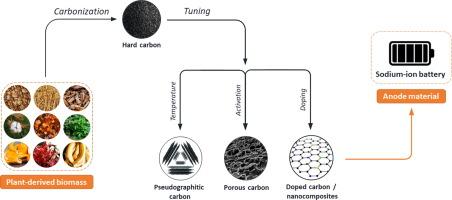Plant-derived hard carbon as anode for sodium-ion batteries: A comprehensive review to guide interdisciplinary research
Abstract
Sodium-ion batteries (SIBs) are one of the most promising candidates to replace lithium-ion batteries (LIBs) in grid-scale energy storage applications. SIBs technology is still in an early development stage and new feasible and low-cost active materials are required. The design of high-performance anodes and the fully understanding of the sodium storage mechanisms are the main bottleneck to overcome. Hard carbons (HCs) are extensively studied as anode material since sodium ions can be intercalated in pseudographitic domains and reversibly adsorbed in surface edges, defects and nanopores. This review aims at providing a comprehensive overview of the current state of knowledge of plant-derived HC anodes in SIBs, which can be helpful for researchers from different backgrounds working in the field. Working principles of SIBs are summarized, together with a detailed description of the Na-ion storage mechanisms in hard carbon anodes proposed to date. Finally, an exhaustive literature review on the performance of plant-derived HCs in SIBs is presented, with special focus on the synthesis pathways (including activation and/or doping treatments).


 求助内容:
求助内容: 应助结果提醒方式:
应助结果提醒方式:


